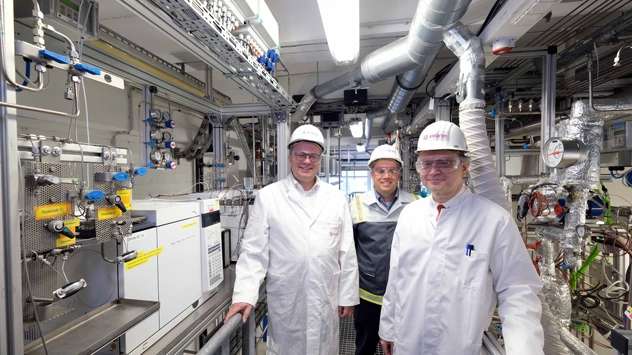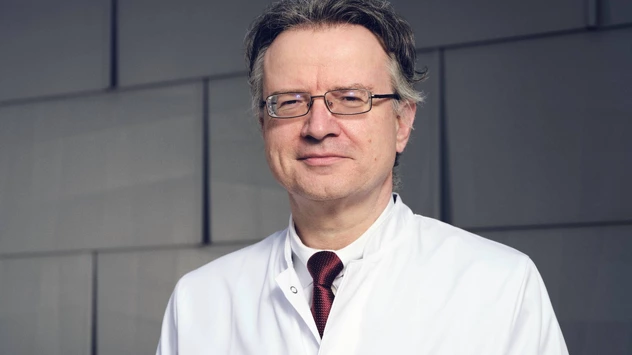
The road to greater energy efficiency: MACBETH project reaches important milestone with positive evaluation by EU
MACBETH, the largest EU-funded research project coordinated by Evonik, has reached its first milestone after 18 months in operation.
- Research project could revolutionize important large-scale reactions in the chemical industry
- Interim results after 18 months show major impact on sustainability balance sheet
- Demonstration plant to be built under real industrial conditions in Marl by the end of 2022
Marl, Germany. MACBETH (Membranes And Catalysts Beyond Economic and Technological Hurdles), the largest EU-funded research project coordinated by Evonik, has reached its first milestone after 18 months in operation. The EU Commission has evaluated the project for the first time - with positive results. The goal of MACBETH is to develop technologies that make important large-scale reactions, such as hydroformylation, significantly more energy efficient. The supervisors believe that the partners involved are on the right track.
"The results so far are impressive. All subprojects are on schedule and well on track," says Carmine Marzano, project officer at the European Health and Digital Executive Agency (HaDEA), responsible for all administrative aspects of MACBETH on behalf of the EU Commission. "If MACBETH succeeds, it would be revolutionary for several important reactions in the process industry," says reviewer Prof. Dr. Annette Juhr. She is a professor of process engineering at Beuth University in Berlin and responsible for monitoring. "With the positive evaluation, we have secured the support of the EU and achieved a very good interim status," says Prof. Dr. Robert Franke, project coordinator for the overall MACBETH project and head of hydroformylation research at Evonik. At the virtual review meeting held in June, all the project partners, the project officer for the EU Commission and the project reviewer came together to get an update the current status.
The EU is funding the measure with a total of 16.6 million euros. 24 partners from ten countries are working on four subprojects until 2024, with the aim of making large-scale reactions more energy efficient. One subproject is being carried out at Evonik at the Marl Chemical Park and concerns hydroformylation. The aim there is to develop so-called catalytic membrane reactors for industrial use. They are already working at laboratory scale - the aim now is to make them suitable for industrial use and to investigate the economic viability of the approach.


"We now want to make the leap from the laboratory to production," says Franke. "Only when we conduct investigations in the production environment, we can make statements about the suitability of the technology. We need to test whether the process is suitable for larger production volumes and if it will work stably over the long term." By the end of 2022, the plan is to set up a demonstration plant under real, industrial conditions at the so-called Oxo plant at the Marl Chemical Park.
There is expected to be a major impact on the sustainability balance of the reactions: since the new membrane reactors separate the resulting product directly from other components, previously standard, energy-intensive separation processes, such as subsequent distillations, would no longer be necessary. As a result, the researchers hope to achieve an increase in energy efficiency of almost 70 percent compared with conventional processes. This will also result a significant reduction in greenhouse gas emissions.
About hydroformylation
In hydroformylation, unsaturated hydrocarbons, so-called olefins, are converted to aldehydes using synthesis gas, a mixture of hydrogen and carbon monoxide. For the Performance Intermediates business line, aldehydes are intermediates on the way to higher alcohols, organic acids or esters, which are then used, for example, as plasticizers in plastics or as surfactants.
Image captions:
Image 1: Membrane module
Image 2: Prof. Dr. Robert Franke, project coordinator for the overall MACBETH project and head of hydroformylation research at Evonik
Image 3: from left to right: Dr. Frank Stenger, Dr. Marc-Oliver Kristen, Prof. Dr. Robert Frank (photo was taken before February 2020)
Company information
Evonik is one of the world leaders in specialty chemicals. The company is active in more than 100 countries around the world and generated sales of €12.2 billion and an operating profit (adjusted EBITDA) of €1.91 billion in 2020. Evonik goes far beyond chemistry to create innovative, profitable and sustainable solutions for customers. About 33,000 employees work together for a common purpose: We want to improve life today and tomorrow.
About Performance Materials
The forever young classics of the Performance Materials Division stand for products and technologies that are continuously improved. They are the basis for many modern applications, for example in the areas of mobility, nutrition, pharmaceuticals or plastics. The divisions portfolio generated sales of €1.98 billion in 2020 with about 1,600 employees.
Disclaimer
In so far as forecasts or expectations are expressed in this press release or where our statements concern the future, these forecasts, expectations or statements may involve known or unknown risks and uncertainties. Actual results or developments may vary, depending on changes in the operating environment. Neither Evonik Industries AG nor its group companies assume an obligation to update the forecasts, expectations or statements contained in this release.



